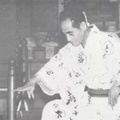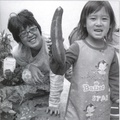This story is dedicated to my Japanese grandfathers. Keiichi Kuida and Yoshio Osumi who I never met, and Masashi Bancho Okazaki, who I wish I could remember.
Mitsugi Yamamoto stared out the window on Christmas Day and wished that his daughter Lorraine would come to visit him at the Keiro Retirement Home. It had been years since her last visit. Mitsugi could still remember how excited he and his wife Sumiko were when Lorraine, their only child was born almost fifty years ago. And he could see so clearly the smile on her face, when she skipped off to her first day at school. Seemed like it was just yesterday.
He recalled the day that Lorraine graduated from college, showing off her diploma. How proud he felt, since he had never been able to finish college himself. Because of Executive Order 9066, he was forced to leave UCLA in his senior year. He found himself stuck in Manzanar for the duration of the war, where he met and married his sweetheart, Sumiko.
Mitsugi’s thoughts were interrupted when Julia came into the room. Julia was a Yonsei, a fourth generation Japanese American college student who did volunteer work at Keiro. She always made it a point to stop in to practice her Japanese with him. Lately, he had been telling her stories of the old camp days.
“Ohayo, good morning, Mr. Yamamoto,” she said cheerfully. “You’re up early today. What would you like for breakfast today, gohan, a little miso soup, some ocha?”
“Nothing today, thank you, Julia-chan. I’m not too hungry. It’s Christmas and I still haven’t heard from my daughter Lorraine. Has she called?” he asked.
“No, I’m sorry, I don’t think she’s called yet, but I’m sure she will. Mr. Yama, your doctor said you need to eat to keep up your strength. I’m going to leave the food by the bed, in case you change your mind.” Julia turned and started to walk out.
“Can you sit down and talk with a lonely old man?” he asked.
“Okay, I think I can take a short break. Why don’t you tell me more about your life at Seabrook Farms?” Julia was particularly interested in hearing about Seabrook, because her own grandmother had also lived in Seabrook, New Jersey.
Mitsugi closed his eyes, as he reminisced about the difficulties they’d faced, especially the years after World War II. The housing shortage and lack of jobs in California had led them and several thousand other Japanese Americans to New Jersey after the war.
“Well, after we left Manzanar, Sumi and I found jobs at Seabrook Farms, a frozen foods factory. We both worked twelve hour days, seven days a week. It was back-breaking labor we did in those days. We lived in quarters not much better than the barracks in camp! Can you imagine?”
Mitsugi sighed and continued, “You know, Julia, my daughter was born in the wintertime back in 1946. It was so cold that year. Sumi and I were young parents, and poor Lorraine was always so sick. Kawai soo. We worried constantly about having enough food, warm clothes and medicine for the baby.” Mitsugi stopped talking for a moment. He hadn’t thought of Seabrook in decades. Julia watched him quietly, waiting for him to continue. “How long did you stay at Seabrook?”
“Ah, Julia-chan. We stayed almost two years. After we came back, we found a house on the Westside and settled there. But it wasn’t easy, neh? We were always struggling to make ends meet. I went to work as a gardener for those big fancy houses in Beverly Hills,” he said.
He didn’t tell young Julia about his bad back. The work was difficult, but he figured that complaining about it now would not do any good. Back then, doctors had been out of the question. They never had enough money and insurance was not an option.
“During those years, Sumi worked downtown LA as a seamstress, while Sumi’s sister cared for little Lorraine. I still feel guilty about not spending enough time with Lorraine when she was growing up, but there was always so much work to be done. I think that’s why she never calls me anymore. Wakarimasu ka?” Mitsugi asked.
“Of course, Mr. Yama, it was hard for everybody in those days. But I’m sure your daughter will call this year.” She looked over at Mitsugi. His eyes were closed and he looked like he had fallen asleep. She tried to nudge him, but he didn’t move. She covered him with a blanket and stepped out of the room. The rice and miso soup sat on his breakfast tray, cold and untouched.
Mitsugi heard her leave. He thought about what he had told Julia about Lorraine. Lorraine and the grandkids were off in their own world, with their busy lives. Too busy for an old man, he thought bitterly. Lorraine had gotten a job and moved away to Seattle, or was it Portland? He couldn’t remember where she lived, but it didn’t really matter since she never visited or called anymore.
He knew Lorraine was working as a civil rights lawyer. She had been involved with the fight for redress and reparations back in the eighties. Even as a child, she had always been so concerned about the rights of other people. He knew it was important work and he was proud of her, but he wished she would just pick up the phone and call every now and then, if only to say hello.
In the beginning, Mitsugi hadn’t approved of Lorraine’s husband, Manuel. He was disappointed that Lorraine had married a Mexican American instead of a “nice Japanese boy.” Over time, he realized that he had been wrong to judge Manny before really knowing him. Manny had taken care of the kids while Lorraine was going through law school and the two men had spent a lot of time together playing with the kids.
Because he liked Manny, he was sad when Lorraine and Manny had gotten divorced a few years back. But he was grateful that they had given him grandkids, two boys and a little girl. His only granddaughter Taylor was 7 or 8, no, must be 10 years old by now. The boys had become teenagers practically overnight, and the oldest one would be in high school this year. How quickly they grew up, he thought. The years went by so fast—but the days passed by so slowly.
Unlike when Lorraine was a child, Mitsugi had been the kind of grandpa to Taylor in the way that he hadn’t been a father to Lorraine. He felt it somewhat made up for the lost years when Lorraine was growing up.
After the family moved away, Taylor would send him cute little letters, but that hadn’t been for nearly two years. Mitsugi kept her letters bundled together in a drawer by his bed, and her drawings were taped on the wall, faded and yellowing.
Outside and downstairs, he heard some children singing Christmas carols. He looked out the window, and smiled with tears in his eyes. Through his tears, he suddenly saw his sweet Lorraine. “Lorraine!” he shouted, “Come to Papa. Here I am!” But then he realized it wasn’t his daughter at all. Lorraine was a grown woman and he couldn’t even remember where she lived. He broke down and cried as he came back in to the present.
Mitsugi gazed at his reflection in the mirror and didn’t recognize the man who looked back at him with those tired and wrinkled eyes. In his mind, he saw images of happier Christmases at home with Sumi and other friends and family gathered around their living room. Those days were all gone now. It was days like this that he missed talking to Sumi. After Sumi had died, he had lived alone until his hip surgery. Shortly after, he had had a stroke. After he was no longer able to get around by himself without a wheelchair, he moved into Keiro.
When he had first arrived at Keiro, he was glad for the company. He even knew some of the people there. Tak was his old friend from the Gardener’s Association, Kimiko had gone to grade school with Sumi, Sets used to run the noodle shop on Sawtelle, and Buddy had been his bowling partner at Holiday Bowl back in the fifties. There were a few other familiar faces from the past, whose names he couldn’t remember.
Mitsugi knew that his old friend Tak’s daughter and son-in-law lived in Alhambra and came to visit Tak every month. And Buddy’s grandkids went to college at Cal State LA and came by when they could. He knew that Tak and Buddy felt sorry for him, but he always made excuses for Lorraine, saying that she was a busy lawyer, raising the kids as a single mother and living so far away.
Later that day, there was a knock at the door. Mitsugi wondered why Julia would knock. She usually just walked right in. The door opened, and there stood his granddaughter, Taylor. She ran over to him and threw her arms around him. Her face was flushed as she rushed to greet him and said in one breath, “Hi Grampa, guess what? Mom got a layoff but she got a new job in Little Tokyo and we’re all moving back to California and mom said I can play basketball and join a taiko group down here and I’m going to a new school and I can come see you every week and we wanted to come down and surprise you, are you surprised? Oh yeah, Merry Christmas!”
He whispered, “Merry Christmas, Taylor-chan, your grandpa really missed you.” As he looked up, he saw his daughter standing in the doorway. Lorraine nodded and smiled, with tears in her eyes.
* This story was originally published in the 1995 Rafu Shimpo Holiday Issue.
© 1995 Jenni Kuida





